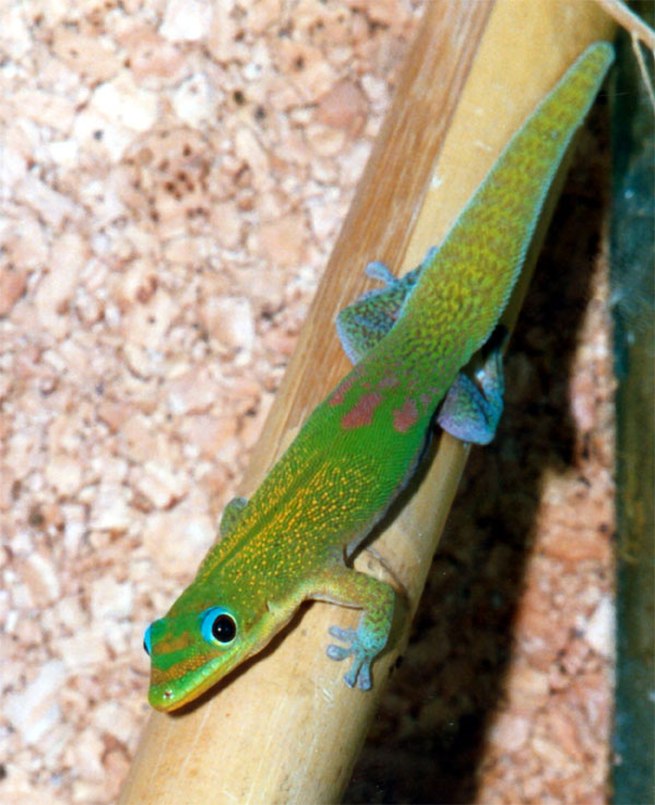-
Gecko
Geckos are lizards belonging to the infraorder Gekkota, found in warm climates throughout the world. They range from 1.6 to 60 cm (0.64 to 24 inches). Most geckos cannot blink, but they often lick their eyes to keep them clean and moist. They have a fixed lens within each iris that enlarges in darkness to let in more light.
Geckos are unique among lizards in their vocalizations, which differ from species to species. They use chirping or clicking sounds in their social interactions, and sometimes when alarmed. They are the most species-rich group of lizards, with about 1,500 different species worldwide. The New Latin gekko and English “gecko” stem from the Indonesian-Malay gēkoq, which is imitative of sounds that some species make.All geckos except species in the family Eublepharidae lack eyelids; instead the outer surface of the eyeball has a transparent membrane, the cornea. Species without eyelids generally lick their own corneas when they need to clear them of dust and dirt.Nocturnal species have excellent night vision; their color vision in low light is 350 times more sensitive than human color vision. The nocturnal geckos evolved from diurnal species which had lost the eye rods. The gecko eye therefore modified its cones that increased in size into different types both single and double. Three different photopigments have been retained and are sensitive to UV, blue, and green. They also use a multifocal optical system that allows them to generate a sharp image for at least two different depths.Most gecko species can lose their tails in defense, a process called autotomy. Many species are well known for their specialised toe pads that enable them to climb smooth and vertical surfaces, and even cross indoor ceilings with ease. Geckos are well-known to people who live in warm regions of the world, where several species of geckos make their home inside human habitations. These (for example the house gecko) become part of the indoor menagerie and are often welcomed, as they feed on insects, including moths and mosquitoes. Unlike most lizards, geckos are usually nocturnal.
The largest species, the kawekaweau, is only known from a single, stuffed specimen found in the basement of a museum in Marseille, France. This gecko was 60 cm (24 in) long and it was likely endemic to New Zealand, where it lived in native forests. It was probably wiped out along with much of the native fauna of these islands in the late 19th century, when new invasive species such as rats and stoats were introduced to the country during European colonization. The smallest gecko, the Jaragua sphaero, is a mere 1.6 cm long and was discovered in 2001 on a small island off the coast of the Dominican Republic.
-
Lizard
Lizards are a widespread group of squamate reptiles, with over 6,000 species, ranging across all continents except Antarctica, as well as most oceanic island chains. The group is paraphyletic as it excludes the snakes and Amphisbaenia which are also squamates. Lizards range in size from chameleons and geckos a few centimeters long to the 3 meter long Komodo dragon.
Most lizards are quadrupedal, running with a strong side-to-side motion. Others are legless, and have long snake-like bodies. Some such as the forest-dwelling Draco lizards are able to glide. They are often territorial, the males fighting off other males and signalling, often with brightly colours, to attract mates and to intimidate rivals. Lizards are mainly carnivorous, often being sit-and-wait predators; many smaller species eat insects, while the Komodo eats mammals as big as water buffalo.
Lizards make use of a variety of antipredator adaptations, including venom, camouflage, reflex bleeding, and the ability to sacrifice and regrow their tails.
-
Gecko (noun)
Any upside-down surfaces.
“vern|geckotid|geckotian|gekkonid”
“lizard”
-
Gecko (verb)
To move in the manner of a gecko; to attach to a vertical or upside-down surface.
-
Lizard (noun)
Any reptile of the order Squamata that is not a snake, usually having four legs, external ear openings, movable eyelids and a long slender body and tail.
-
Lizard (noun)
Lizard skin, the skin of these reptiles.
-
Lizard (noun)
An unctuous person.
-
Lizard (noun)
A coward.
-
Lizard (noun)
A hand forming a “D” shape with the tips of the thumb and index finger touching (a handshape resembling a lizard), that beats paper and Spock and loses to rock and scissors in rock-paper-scissors-lizard-Spock.
-
Lizard (noun)
A person who idly spends time in a specified place, especially a promiscuous female.
“lounge lizard; lot lizard; beach lizard; truck stop lizard”

